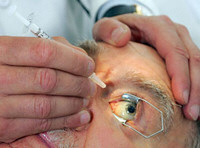Newsletter Issue 4 | Jun 2010
Florida Eye News and Views

Dear Readers:
It’s hard to believe it but summer is just around the corner, so this is the perfect issue for us to share some summer eye care tips with you as well as fill you in on what’s been happening at Florida Eye for the past few months and what’s coming up in the near future.
Most recently we presented our third continuing education course for optometrists at Bogart’s Bar & Grille, located in Cinemark in Boca Raton. Everyone who attended told us they had a terrific time. You’ll be able to read more about it and view some photos in our newsletter and on our Facebook page.
In clinical trial news, we are very happy to report continuing positive results for Dr. Katz’s clinical trial studies with the new anti-PDGF drug by Ophthotech, which compares Lucentis with anti-PDGF medication to just Lucentis.
We are also very happy to share a patient success story with you. Sal* has been receiving the medication Lucentis for the past eight months, and has gone from being “almost blind” to seeing “the textures of walls and individual blades of grass.”
Also in this issue, our doctors answers your eye care questions, and on the cosmetic/medical front, Dr. Schechter shares why it’s important to have a proper eye exam before deciding to use Latisse to grow, darken and thicken your eyelashes.
Lastly, have fun taking the “Real Age” Age Eying Quiz and see how your eyes are doing.
Enjoy, and have a fabulous, safe summer.
Best,

Gwen Cohan
Director of Marketing & Public Relations
In this Issue:
Florida Eye’s Third Continuing Education Seminar »
Protecting Your Eyes (and Your Children’s Eyes) from the Sun »
Florida Eye Hosts Its Latest Educational Seminar at the Movies!
The May 5th Educational Seminar held at Bogart’s Bar & Grill at Cinemark in Boca Raton was enjoyed by the optometrists attending for credits as well as by the Florida Eye Microsurgical Institute doctors lecturing at the event. Drs. Lee Friedman and Randy Katz of Florida Eye shared the latest updates on Retinopathy of Prematurity & Its Complications & Macular Degeneration & Retinal Vascular Disease Treatments, respectively.
The event, which was co-sponsored by Ista Pharmaceuticals began with cocktails and appetizers in the screenwriter’s room, and continued with dinner and the lectures in the director’s room. Dr. Barry Schechter of Florida Eye served as the evening’s MC.
Some of the comments received via Facebook:
“Thank you for a great CE on Wednesday. Very informative and entertaining!” — Jill Burg Marrotte
“Fabulous evening — the food was good, the camaraderie was awesome, the lectures were interesting and informative, and the slides were priceless. Thank you again!” — Tamara Maule Fish
“Thank you for the nice dinner, venue and education!” — Trisha Sagmiller
“Great lectures, guys! Thanks!” — Carol Hecker Nason
Florida Eye’s next educational seminar will be held Wednesday, October 6, 2010. Stay tuned for details on the venue. For additional information on Florida Eye’s continuing educational seminars or its clinical trials please call Gwen Cohan at (561) 736-5050 or email [email protected].


Visit our Facebook page to see more pictures of the event.
Clinical Trial Updates
Dr. Randy Katz, Florida Eye’s Vitreo-Retina, Diabetic Retinopathy, Retinal Detachment & Macular Degeneration Specialist is thrilled about the positive results he’s been seeing during trials with a new anti-PDGF drug which compares Lucentis with anti-PDGF medication to just Lucentis. “The initial trial results show that 60% gained 3 or more lines of vision compared to 40% for Lucentis alone,” says Dr. Katz.

Enrollment for this study will most likely be completed in July.
If a doctor refers a patient for any Florida Eye study, Dr. Katz would of course update the participating doctor on the patient’s progress and return the patient to the doctor’s care at the end of the study. The sponsor covers all expenses and costs of these trials.
Dr. Barry Schechter, the Institute’s Refractive Cataract Surgery, Glaucoma, Cornea & External Disease Specialist is currently conducting a study of one company’s punctal plugs. They are being assessed for comfortability and their position in the eyelids over 6 weeks. Normal healthy adults over 50 can apply to be a part of this study and are reimbursed for their participation.
For more information regarding any of the studies, please call Study Coordinator Debbie Rankin at (561) 736-5055 or email her at [email protected].
On a side note, we were able to arrange for one of our diabetic retinopathy patients (no insurance) to receive bilateral Lucentis at no charge through the Lucentis Access Program. He has gone from 20/100 ou to 20/25. His story is the subject of our next section.
Patient Success Story
Life is beautiful for Sal*, who can now see clearly thanks to Lucentis!
Sal’s eyesight was getting so bad that he knew it wouldn’t be long before he might be virtually blind. When he came to Florida Eye, he told Dr. Randy Katz, Florida Eye’s Vitreo-Retina, Diabetic Retinopathy, Retinal Detachment & Macular Degeneration Specialist, that he “felt as close to blind as I guess I could be.” Sal says he knew he was losing his sight, plain and simple.
Kind of ironic for Sal, since he has spent a lifetime helping people to see better himself, as an optician in New Jersey.
After a thorough exam, Dr. Katz diagnosed Sal with diabetic retinopathy. He noted that Sal already had numerous laser treatments in each eye as well as kenalog intravitreal injections that did not improve his vision at all. “Sal had quite a bit of swelling and there was also hemorrhaging,” explains Dr. Katz. “I decided the best possible course of action for him would be to get him started on bilateral Lucentis. In a matter of eight months on the drug, the former optician went from 20/100 ou to 20/25.

“Luckily we were able to arrange for Sal, who had no insurance, to receive bilateral Lucentis at no charge through the Lucentis Access Program,” says Dr. Katz. “That option may be available for other patients, or, if a patient who hasn’t had any previous types of treatments for their eye condition qualifies, they may be eligible to participate in our national clinical trial study. If they did qualify, their treatments with Lucentis (which normally costs about $2,000 per dose) would be administered at no charge, along with their medical visits and follow-up care.”
Sal is most appreciative of Dr. Katz’s efforts and says he will be eternally grateful. “Before I started Lucentis,” says Sal, “I felt like I was looking through a dirty window — I couldn’t see at all. Then as the months went by, I told Dr. Katz that there were patches of clean, clear window through all of the dirt. Now, eight months later I feel like the windows are sparkling clean.”
For more information about Lucentis or diabetic retinopathy in general, contact Gwen Cohan at (561)736-5050 or Study Coordinator Debbie Rankin at (561) 736-5055.
* Sal’s last name has been omitted from the story for patient confidentiality.
Protecting Your Eyes from the Sun
Courtesy of Florida Eye & Prevent Blindness America

Living in Florida, our eyes are exposed to more sunlight than people living in other regions. We spend more time on the beaches, in the water, and on the tennis courts and golf courses. And when we go on winter vacations, many of us head to the snow and slopes. Guess what? More sun reflecting off bright surfaces. Any way you slice it, protecting your eyes is a must, and with summer just around the corner, now is as good a time as any to educate yourself on the best ways to protect your eyesight.
What are UV Rays and How Can they Damage Your Eyes?
There are two types of UV rays: UV-A and UV-B.
The first, UV-A, can hurt your central vision. It can damage the macula, a part of the retina at the back of your eye.
The second, UV-B, can damage the front part of your eye — the cornea and the lens — which absorbs most UV-B rays, but these rays may cause even more damage to your eyes than UV-A rays.
What eye problems can UV rays cause?
Over time, the effects of UV rays may help cause a number of eye problems.
Macular Degeneration
UV rays may lead to macular degeneration, a leading cause of vision loss for older Americans.
Cataract
UV rays, especially UV-B rays, may also cause some kinds of cataracts. A cataract is a clouding of the eye’s natural lens, the part of the eye that focuses the light we see.
Pterygium
Another UV-related problem is a growth called pterygium. This growth begins on the white of the eye and may involve the cornea. Eventually, the growth may block vision. It is more common in people who work outside in the sun and wind.
Skin Cancer
Skin cancer around the eyelids is also linked to prolonged UV exposure.
Corneal Sunburn
Corneal sunburn, called photokeratitis, is the result of high short-term exposure to UV-B rays. Long hours at the beach or skiing without proper eye protection can cause this problem. It can be very painful and may cause temporary vision loss.
CIN
Conjunctival and corneal squamous lesions are pre-cancerous ocular tumors which can become malignant. They are usually associated with UV ray exposure as well as papillomaviruses.
How Can I Protect My Eyes from UV Rays?
You can protect your eyes from UV rays in two important ways:
- Know the dangers of UV rays.
- Wear proper eye protection and hats that block UV rays.
UV rays can come from many directions. They radiate directly from the sun, but they are also reflected from the ground, from water, snow, sand and other bright surfaces.
Use eyewear that absorbs UV rays and wear a brimmed hat or cap. A wide brimmed hat or cap will block about half of UV rays. A brimmed hat or cap can also limit UV rays that hit the eyes from above or around glasses.
Eyewear that absorbs UV rays gives you the most protection. All types of eyewear, including prescription and non-prescription glasses, contact lenses and lens implants, should absorb UV-A and UV-B rays. For UV protection in everyday eyewear, there are several options like UV-blocking lens materials, coatings and photochromic lenses. UV protection does not cost a lot of money and does not get in the way of seeing clearly.
Choosing Sunglasses

You should choose sunglasses that:
- Reduce glare.
- Filter out 99-100% of UV rays.
- Protect your eyes.
- Are comfortable to wear.
- Do not distort colors.
Be aware that if you are at the beach or on the ski slopes, you should wear sunglasses with a darker tint to block more light. Your risk of eye damage from the sun is greater because of reflection off the water and snow.
Read the labels! Always read labels carefully and look for labels that clearly state the sunglasses block 99 to 100% of UV-A and UV-B rays.
Eye Care Questions
Dear Dr. Schechter:
I am getting to the point where my cataracts are interfering with my daily activities, so I think I’ll have surgery soon. But I take Flomax on a daily basis, and I’ve heard that it can cause a problem during eye surgery. Is that true?
Answer

Flomax and other alpha blockers used to treat prostate enlargement can potentially cause difficulty during cataract surgery, because Alpha-blocker drugs block the dilator muscle in the iris, and during cataract surgery, the pupil needs to be dilated. However, preliminary results of a study found that patients taking alpha-blocker prostate drugs can still have successful surgery if their surgeon knows they are taking or have ever taken these drugs and alters surgical technique. It’s very important to talk to your ophthalmologist about Flomax and any other drugs that you may be taking.
Of course, when necessary, I utilize several maneuvers and techniques which I employ regularly in these cases to manage successful outcomes, I have co-authored a textbook chapter on this subject — so taking Flomax and other alpha blockers does not mean surgery is not an option.
Dear Dr. Katz:
I awoke in the night feeling what I thought was a piece of fabric in my eye. I tried to remove it but there was nothing there. The next morning I found I had what appeared to be a black square shape impeding my vision in that eye. What alternative eye conditions could these symptoms indicate and are they treatable? Thank you.
Answer

I’m not quite sure what you mean by symptoms like fabric. Were you seeing a thread in the vision floating or did you have a foreign body sensation like a grain of sand on the eye? These are two different issues.
If the symptom was the first and now you have a black square impeding the vision I would be very concerned about a floater and the possibility of a retinal tear or detachment. If it was the latter, perhaps in trying to get this irritant out you scratched your cornea, causing visual loss, but this would very likely also be associated with some significant pain.
Both scenarios need immediate attention and I strongly recommend that you see an ophthalmologist as soon as possible.
Dear Dr. Gorscak:
My father has Glaucoma and he was reading and he said that they have a new eye drop for Glaucoma. Do you know of any new (recent) eye drops for Glaucoma?
Answer

Medications to treat glaucoma become widely available after FDA approval. Currently, no new class of glaucoma drugs have recently been FDA approved, however over the last few years there have been many advances in the methods of medical and laser treatment.
Dear Dr. Friedman:
Do children need sunglasses?
Answer

Yes. Children are at special risk from the harmful effects of UV rays, since their eyes do not have the same ability as adults to protect from UV radiation.
Here are some helpful suggestions for choosing sunglasses for children:
- Check to make sure the sunglasses fit well and are not damaged,
- Choose sunglasses that fit your child’s lifestyle — the lenses should be impact resistant and should not pop out of the frames,
- Choose lenses that are large enough to shield the eyes from most angles.
- Find a wide-brimmed hat for your child to wear along with the sunglasses. This will give your child extra protection against the sun. Wearing a hat can cut the amount of UV rays that reach the eyes in half.

Dear Dr. Chua:
How can I stop the spasm on my eyelids? First it was one eye then both of them. And now it’s in different places around the eye.
Answer

This sounds like blepharospasm, a condition where the muscles of one or both eyelids forcibly spasm, causing the eye to squeeze shut. This condition can result for a variety of reasons, such as severe dry eye, other types of irritations, inflammations and even numerous cornea-related problems. A full exam by your ophthalmologist is necessary to determine the cause.
In many cases no cause is found for this symptom and a diagnosis of benign essential blepharospasm is made. It is called benign because it is not associated with any disease and essential because you have no control over it. Botox injections can be used to paralyze the muscles that have spasm. This often improves symptoms, however the injections need to be repeated over time.
The Truth About Latisse
Many of our patients have been enjoying longer, fuller, lusher lashes with Latisse, a prescription medication that makes your lashes longer, thicker and fuller. Latisse™ is 0.03% Bimatoprost, which is the same active ingredient as Allergan’s glaucoma medication, Lumigan™. Doctors found that one of the side effects of Lumigan™ was an increase in the darkness, thickness, length and number of eyelashes. Lumigan™, a prescription eye medication not a cosmetic, grew impressive eyelashes in men and women alike.
Originally, Latisse™ was intended to be used in the treatment of hypotrichosis (the medical term for inadequate or insufficient eyelashes) in cancer patients that had lost their eyelashes while undergoing chemotherapy or radiation, but has now been approved by the FDA as an eyelash beautifier.
Latisse™ is applied once a day, in the evening, to the base of the upper eyelashes with a single use, sterile applicator. A new applicator is then used on the second eye. Repeating this daily will cause thicker, longer, darker and more numerous eyelashes.
Florida Eye’s Dr. Barry Schechter says “Many patients, staff and even family members have been very pleased with the improved length and density of their lashes since using Latisse. I highly recommend it.”
One of our patients, an audiologist in Delray Beach, has been using Latisse for several months and she absolutely loves the product. “It’s become a part of my routine,” she explains. “Wash my face, brush my teeth, apply the Latisse and that’s that. I get so many compliments on my lashes — I love them!”
Allergan states that 4% of the patients experienced minor itching or eye redness. Latisse™ should not be used if you are allergic to the any of its components, have an active infection or broken skin. Less common reactions are skin dryness, darkening or redness of the skin or ocular irritation.
Like many other medical offices, Florida Eye offers Latisse and has it available for purchase in our Boca, Boynton and Wellington offices, however, the practice will not write scripts or sell Latisse unless a prospective user has had a basic eye care exam in the past year.
How do You Know if Latisse™ is Right for You?
The first step is to schedule an appointment for a consultation with Dr. Schechter. He can evaluate your medical history and examine you to determine if you are a good candidate for Latisse™. For more information call Gwen at (561) 736-5050. For an appointment for an eye exam call (561) 737-5500.
Cosmetic Specials
For the entire months of June, July and August, Dr. Schechter is offering special pricing on Botox, Juvederm and Latisse. Appointments are available in our Boca Raton and Boynton Beach locations.
Also — Receive $100.00 off Juvederm and Botox treatments with the purchase of a box of Latisse.
Call (561) 736-5050 or email [email protected] or [email protected] to book your appointment with Dr. Schechter or learn more about these specials.
This offer is not valid with any other offers.
What’s Your “Real Eye Age?”
We found the following fun and informative quiz for assessing your “biological” eye age (courtesy of realage.com). Compare it with your actual calendar age to see how your vision stacks up. Click below to take the quiz.
Final Tidbits
Congratulations to Florida Eye’s Lisa Barlow and her fiancé, Rick Sparveri on their marriage May 30th in Orlando. We wish Lisa & Rick all the best!

